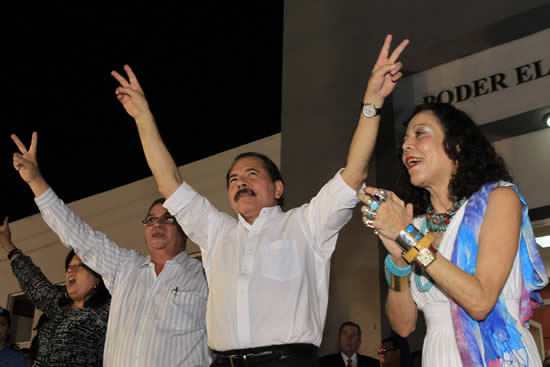Who Lost Nicaragua? Daniel Ortega Begins an Unconstitutional Third Term
Ray Walser /

Nicaragua's President Daniel Ortega greets supporters after he was certified by the Supreme Electoral Council (CSE) as president from 2012 to 2016, while flanked by his wife Rosario Murillo (R) and Vice President Omar Hallesleven in Managua January 9, 2012. Ortega will be sworn in on Tuesday for a second term as president. REUTERS/Oswaldo Rivas
Daniel Ortega—sporting pink campaign colors rather than the combative red and black of the Sandinista Front (FSLN) and dressed in a business suit, or guaybera, rather than olive drab fatigues—ushers in a modified and somewhat softer era of tyranny as he begins a second consecutive and unconstitutional term as president of Nicaragua.
While the revolutionary, combative fervor of the Marxist-Leninist FSLN has largely gone the way of the Cold War, it has been replaced with a cynical, pseudo-democratic, and self-perpetuating grip on executive power.
On January 10, as Ortega again dons the presidential sash, headline grabbers in attendance include touring Iranian leader Mahmoud Ahmadinejad and his sidekick and close ally, Venezuela’s Hugo Chavez, Ortega’s primary bankroller. Cuba’s communist regime—the original inspiration for the FSLN and its earliest backer—will be represented by Raul Castro’s eminence grise, Ramiro Valdes. Most democratic presidents are sending representatives but themselves giving the event a pass.
On the path to the podium, Ortega has successfully dismantled Nicaragua’s nascent democratic institutions. His assault on democracy began well before the 2006 election and his first term in a pact with corrupt ex-President Arnoldo Aleman to lower requirements for election to the presidency. In the 2008 municipal elections, Ortega and the FSLN then fraudulently garnered power at the local level and began a systematic assault on civil society.
By 2011, Ortega engineered the quasi-legal maneuvers that allowed him to justify proceeding with his re-election campaign despite a clear constitutional prohibition against it. On election day in November 2011, Ortega delivered his coup de grace to the democratic process, winning a popular majority while eliminating transparency, fairness, and independence. Fraudulent FSLN possession of a supermajority in Nicaragua’s single national legislative body means that Ortega now controls all the institutions of the Nicaraguan state: the legislature, the courts, and the electoral tribunal.
Ortega’s Machiavellian ability to manipulate Nicaragua’s electoral and institutional system is representative of the neo-authoritarianism movement that continues to undermine representative democracy in the Americas. It has brought protest from leaders in both houses of Congress who believe the U.S. should stand more boldly for democracy in the Americas.
In the 1980 elections in the U.S., many foreign policy critics asked: “Who lost Nicaragua to the FSLN, Cuba, and the Soviet Union?” They pointed fingers at a well-intentioned but weak President Jimmy Carter.
In 2012, fresh voices of the post–Cold War era want to know: “Why has Nicaragua been handed over to Daniel Ortega, Hugo Chavez, and Mahmoud Ahmadinejad?”
